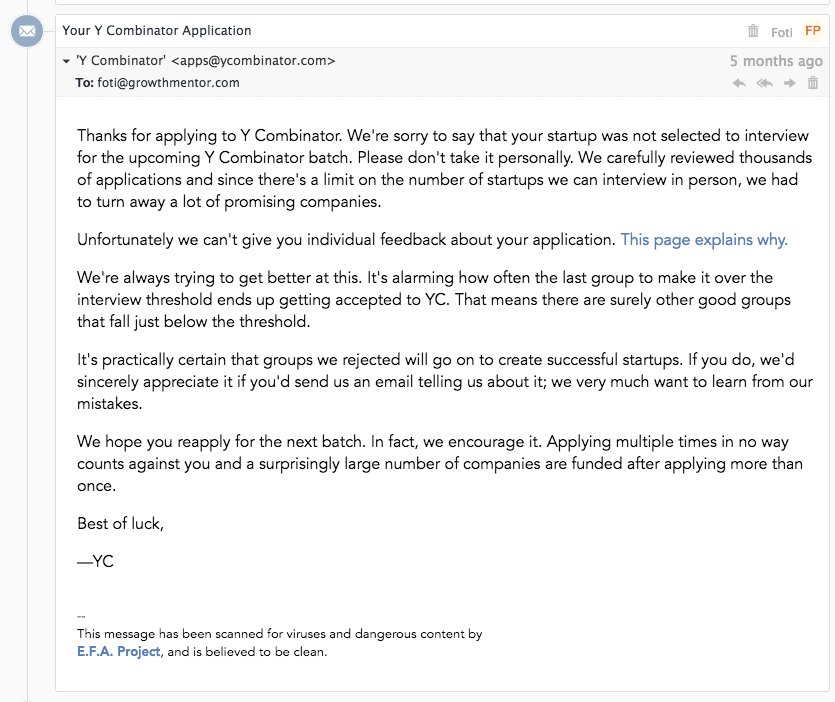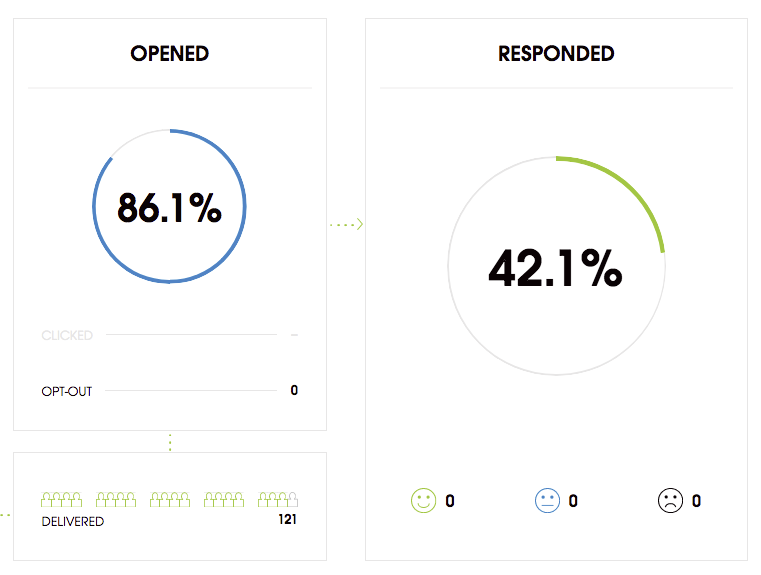How to get into Y Combinator according to the founders that did get in
- 1.From Wolf of Wall Street to a "Made Man" in Silicon Valley
- 2.How LendEDU Raised the Most Valuable Seed Round Imaginable with Y Combinator
- 3.Kyle Killion's story of getting Suiteness into Y Combinator along with tips on how to apply
- 4.Rotem Yakir shares Guggy’s story of evolving from "just another Israeli Startup" to a YC startup
- 5.The True Story of How Orion Willow Got Lendsnap Accepted Into Y Combinator
- 6.Nicky Goulimis shares Nova Credit's Path to Y Combinator Acceptance and Beyond
- 7.Katherine Nammacher Chronicles RideAlong’s Journey Into Y Combinator
- 8.The Story of How a Sofa Startup Got Into Y Combinator with Just a Pitch Deck
- 9.The story of how two college friends joined forces to disrupt an industry with Iris Automation
- 10.How 4 Swedes got their SaaS accepted into Y Combinator while still at $0 MRR
- 11.The story of when 8 x Co-Founders flew from Denmark to San Francisco for Y Combinator
- 12.Ryan Chan the founder of UpKeep shares his Y Combinator Journey
- 13.Pedro Goes of InEvent shares his Y Combinator Journey
- 14.Itay Forer of Cleanly shares his Y Combinator Journey
- 15.How to get into Y Combinator according to the founders that did get in
- 16.What It Was Like Doing Y Combinator a Second Time
Getting into Y Combinator is seen by many startups as the ultimate stamp of approval.
A sort of “golden key” that opens doors you didn’t even know existed. So it’s not surprising that over 10,000 startups apply during each cycle.
But how do you actually get into Y Combinator?
Learning how to get into Y Combinator from the stories of the founders who pulled it off
After applying myself and not getting in (I applied in April 2019 for the S19 batch), I decided to finally do some research.

In hindsight, my application was quite bad. I don’t blame them at all for the rejection.
There’s a lot of “how to get into Y combinator” advice out there, but most of the time it’s from a single vantage point, in other words, biased.
This blog series was born out of a simple thought – what if I just reach out to the founders that actually did get in, and just straight up ask them how they got in?
Benefits:
- I’d learn firsthand how to increase my chances at the next application
- I’d help anyone else thinking of applying by sharing my learnings on the blog
- I’d get to talk/meet/network with awesome YC founders!
Win-Win-Win.
So I proceed to do exactly that.
Here is the exact cold outreach template I sent:
I outreached to the cohorts from the last 3 years only because the freshness of data was important to me.
I happily surprised to see so many Y Combinator founders reply back to me with enthusiasm to share their stories.
Here are the stats from the campaign:

For those not into cold email, 42% reply rate is really really good.
Around half the replies were along the lines of, “this sounds really cool, but I’m in the middle of <insert here something super important like raising millions of dollars>,” and the other half were like, “sounds great, send me your calendar!”
Getting on the calls and doing the interviews
My first interview was with Richard Bronson from 70millionjobs.
I spent around 30 minutes before that first call thinking about what questions I’d ask.
These would be the same questions I’d end up asking all the founders I interviewed.
I decided these five questions:
- Why did you decide to apply to YC?
- Did you already have traction before applying?
- How much time/effort did you put into the application?
- What were the biggest benefits beyond just the money from entering into YC?
- One tip for founders thinking of applying
I’d occasionally sprinkle in other questions, too, but for the most part, I stuck to those five.
Here are the interviews!
- From Wolf of Wall Street to a "Made Man" in Silicon Valley
- How LendEDU Raised the Most Valuable Seed Round Imaginable with Y Combinator
- Kyle Killion's story of getting Suiteness into Y Combinator along with tips on how to apply
- Rotem Yakir shares Guggy’s story of evolving from "just another Israeli Startup" to a YC startup
- The True Story of How Orion Willow Got Lendsnap Accepted Into Y Combinator
- Nicky Goulimis shares Nova Credit's Path to Y Combinator Acceptance and Beyond
- Katherine Nammacher Chronicles RideAlong’s Journey Into Y Combinator
- The Story of How a Sofa Startup Got Into Y Combinator with Just a Pitch Deck
- The story of how two college friends joined forces to disrupt an industry with Iris Automation
- How 4 Swedes got their SaaS accepted into Y Combinator while still at $0 MRR
- The story of when 8 x Co-Founders flew from Denmark to San Francisco for Y Combinator
- Ryan Chan the founder of UpKeep shares his Y Combinator Journey
- Pedro Goes of InEvent shares his Y Combinator Journey
- Itay Forer of Cleanly shares his Y Combinator Journey
- What It Was Like Doing Y Combinator a Second Time
So without further ado, here are some of the key takeaways from the Y Combinator interviews!
Here’s what the founders had to say about why they applied…
- The brand is super powerful, no other accelerator can compete
- Forces you to be at 100% intensity for 3 months straight
- It was their first time founding a business, and they wanted to learn from the best
- No faster way to get networked in Silicon Valley, instant street credibility
- Getting into YC is the best way to hit the USA market as a foreign founder
- Having the Y Combinator badge of approval is a magnet for investors all over the world
- Having the Y Combinator badge of approval is a magnet for investors all over the world
- The initial $150k in seed funding is nice (but it was rarely in the top 3 reasons why they wanted to get in)
Here’s what the founders had to say about traction…
- To get in without significant traction you need either a very good team who’s been building things before and proving they can do it or you need a crazy idea or some unique insight that solves a problem in a way that’s never been thought of before.
- Keep applying, even if you don’t have insane traction second time around, but can show you’ve made some significant progress since your first application, it might be enough. Most of the founders I interviewed got in on their second application.
- There are a wide variety of startups that get accepted into YC, some that have zero traction, others that have $1,000 MRR, and others that are already making millions of dollars in revenue.
- The focus is much less on how much traction your startup has, but more so on “what companies could benefit from YC,”
How much time these startups spent collectively on their written applications …
- Lendsnap: 3 hours over a week, but they did other accelerators first which reduced the amount of time needed
- Suiteness: 2-3 hours on the application
- Peergrade: 5-8 hours of concentrated time. Their answers were all very short though, we’re talking 2-3 sentences each
- LendEDU: 5 hours the first time and 20 minutes on their second try
- 70millionjobs: Not a lot of time at all, it was a no stress thing
- Guggy: 2-3 days of research/writing, and around half a day to record the 1 minute video
- Burrow: Within a week each of the (2) co-founders spent around 8 hours on the written application
- GetAccept: 2 weeks across 2 people
- Manycore: Around a week
Here’s what the founders had to say…
- Remember that the partners have to review 10,000+ applications so you need to be very concise and efficient in your communication and get to the point quickly.
- It’s really important to make sure that you’re not in an echo chamber. We asked several people to read it that had no idea about our industry, but who had gone through YC.
- Y Combinator just wants you to get to the point: “Did you do this or did you not do this? If you did this, what are the metrics to tell me how you did it, and how you did it?”
- For the written application, it’s really about showing – not telling.
- Copy the questions over in Google Docs for the application form, write out very concise clear answers to the questions, and then find one person who knows how to get into YC and ask them if they’re willing to read through your application. Don’t ask 10 people. Find one person that was really good, get them to read your application for you, and then iterate on their feedback and send it in.
- If you can condense it down you can make the quality a lot higher.

David Kofoed Wind co-founder and CEO of @ PeergradeIt’s such a YC thing. They really, really value conciseness – To such a degree that it almost becomes crazy. But it is so important for YC to be able to just read in one sentence and understand what you are actually doing.
Here’s what the founders had to say…
- You need to be able to answer the questions very quickly. Practice with your friends, but better yet, reach out to Y Combinator alumni and ask them to give you mock interviews
- Just like a job interview, you want to make sure that you don’t box yourself into a corner with how you lead the conversation with your answers
- One of the best ways to prepare is to just be out there pitching what you’re doing to angel investors
- Distribute the questions so that everyone in the team talks. It can look bad if it’s just one person talking as it suggests the others are redundant
- Be prepared to demo your product at the drop of a hat. Y Combinator is after all a tech incubator
- Have self-awareness about the weaknesses in your business. It’s really easy to be focused on just pitching, but talking about what some of your concerns are and being able to address those makes for a much more productive conversation.
Nicky Goulimis co-founder and COO of Nova CreditIt’s think doing a startup is all about figuring out how you can go that extra mile, and the YC application is no different.
Biggest benefits of Y Combinator besides just the money?
Here’s what the founders had to say…
- It’s definitely the network, just being able to post on Bookface or email any other YC founder and get advice or help, or just to listen to the problems we face. The access to partners is great, but that’s actually secondary to the founder community which is by far the most important part.
- We were able to fundraise in a way that we wouldn’t have otherwise been able to, and also it made it so much easier to attract amazing talent to our team.
- There’s this understanding with other founders, especially within the YC community, that you are on the “startup founders trying to change the world” team together that I’ve never experienced before.
- I’ve met some of my best friends through Y Combinator, people that I can call in the middle of the workday for business advice. And if they can’t talk to me during the day, they’ll call me back that night. You are in a special group where people show up for you and help you – and you do the same for them in return.
Richard Bronson founder of 70millionjobs (YC S17)Having gone through it I became a sort of a “made man in Silicon Valley.” Before Y Combinator I felt like I was kind of observing everything from the outside, looking in on the window. I knew no one, no one knew me, and no one knew my company. I knew there was money, funding, connections, and opportunity, but how could I access it? Y Combinator is that invitation. Getting accepted into Y Combinator gives a certain level of credibility that’s automatically bestowed upon you.
Here’s what the founders had to say…
- If you Google “YC interview questions” or “what are they going to ask in a YC interview” there are tons of great articles out there about it. There are some that have very long lists. I found these to be pretty accurate when talking to other founders.
- You’re probably going to be asked “what is the most impressive thing you’ve accomplished” as an individual or as a team. Give the one best answer rather than giving your top five things because mentally people are going to take an average of the awesomeness of these things, and they’re not all going to be as awesome as the most awesome thing.
- Y Combinator does look for huge market-sizes and potential billion-dollar businesses, but I think positioning how you have an unfair advantage and are uniquely positioned to solve a big problem is often left out of the application.
- Go talk to folks who have gone through Y Combinator, start with those in your network, but if you don’t have anyone in your network, you can reach out on LinkedIn or just email them.
- Just do it. Even if you get accepted, but then you decide for whatever reason you don’t want to do it, there’s not really a huge downside to just applying and seeing if you can get in.
- If you don’t get in the first time just apply again! There’s actually like some crazy statistic on like the percentage of startups that get in after being rejected the first time and it’s really high.
- Just keep doing it! My guess is that they also look for people that apply throughout the growth of their company as they’re learning, and they want to see you learn and fail and make mistakes and find what works. So they like to see you come back again and again.
- Too many people believe that they need to go out and get the funding or find the developers and technical co-founders in order to start and execute an idea. That’s not true. If you’re not the developer, then learn how to code. Think about your Minimal Viable Product (MVP). Sometimes, it could be a simple spreadsheet or a landing page. Nothing stops us from getting where we want to be.
- In terms of the application itself, like any application process find a way to shine. Hustle, try and get in front of some YC Partners before you even apply. Anything that you can do to differentiate yourself and show your commitment.
- Attack your own company with questions like, “why is it good, why people should use it, even if they use it how will you make money”. I asked my co-founder to hit me with as many questions as he can by thinking like an investor and I did the same to him. You have to really try and destroy your idea, which is sometimes uncomfortable for founders.
Are you a Y Combinator founder that wants to share your insight?
If you’d like to be featured in this blog series we’d love to hear from you!
Fill in the Typeform here and I’ll reach out to you.




